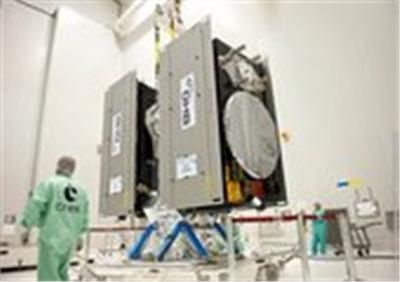Wed, Aug 20, 2014
Final Functional Testing Complete At Spaceport In French Guiana
Final functional testing of Europe’s twin Galileo navigation satellites has been completed at Europe’s Spaceport in French Guiana, on track for launch this Thursday. The fuelling of the two satellites, allowing them to fine-tune their orbits and maintain their altitude over the course of their 12-year lifetimes, took place on August 7–8.

Engineers donned protective SCAPE (Self Contained Atmospheric Protective Ensemble) suits to fill the satellites with hydrazine propellant. Then, on 11 August, the two satellites were installed together on the flight dispenser that secures them to the Soyuz launcher’s Fregat upper stage.
The follow-on installation of the stack – the two satellites plus dispenser – onto the Fregat stage was completed on 15 August , then encased within its protective launch fairing.
The combined upper composite – also known as the ‘space head’ – was attached Monday to the other three stages of the powerful Soyuz ST-B launcher ready to haul it up into orbit on Thursday.
Final operations for the launch will proceed early this week with a final countdown leading to a launcher liftoff scheduled for Thursday, 21 August. At three hours, 47 minutes and 57 seconds after liftoff, the satellites will then be deployed from their Fregat by the dispenser’s pyrotechnic separation system once their final altitude is reached.
These new satellites will join four Galileo satellites already in orbit, launched in October 2011 and October 2012 respectively.
A steady stream of launches is planned for the next few years, with two Galileo satellites flown per Soyuz launch and four Galileo satellites flown per launch of an Ariane 5 variant currently in preparation. The definition, development and In-Orbit Validation phases of the Galileo programme were carried out by ESA and co-funded by ESA and the EU.
The Full Operational Capability phase is managed and fully funded by the European Commission. The Commission and ESA have signed a delegation agreement by which ESA acts as design and procurement agent on behalf of the Commission.
(Image provided by ESA)
More News
DETRESFA (Distress Phrase) The code word used to designate an emergency phase wherein there is reasonable certainty that an aircraft and its occupants are threatened by grave and i>[...]
"General aviation is at the forefront of developing and introducing innovative technologies that will transform the entire aviation industry..." Source: Kyle Martin, Vice President>[...]
Direct Straight line flight between two navigational aids, fixes, points, or any combination thereof. When used by pilots in describing off-airway routes, points defining direct ro>[...]
Aero Linx: Women in Corporate Aviation Women in Corporate Aviation support individuals seeking career advancement and professional development in the business aviation industry. Me>[...]
“We would like to thank the many volunteers that help throughout the year to pull off the event, as well as the several reviewers, judges, and SURVICE staff that provide team>[...]
 ANN's Daily Aero-Term (04.26.24): DETRESFA (Distress Phrase)
ANN's Daily Aero-Term (04.26.24): DETRESFA (Distress Phrase) Aero-News: Quote of the Day (04.26.24)
Aero-News: Quote of the Day (04.26.24) ANN's Daily Aero-Term (04.27.24): Direct
ANN's Daily Aero-Term (04.27.24): Direct ANN's Daily Aero-Linx (04.27.24)
ANN's Daily Aero-Linx (04.27.24) Aero-News: Quote of the Day (04.27.24)
Aero-News: Quote of the Day (04.27.24)



